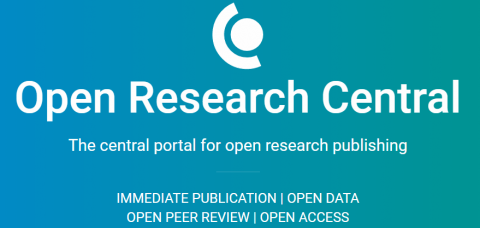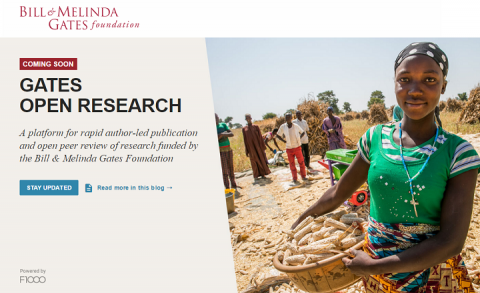ORC – Open Research Central: ‘repulsive and malevolent’ or ‘lover of rebellion and freedom’
| 12 July, 2017 | Vitek Tracz |
|

|

Orc emerges from creative fires to challenge the forces of imperialism in plate 12 of America a Prophecy - William Blake
Today, we are introducing a new meaning to the word “ORC”.
Many will know Orc as the “brutish, aggressive, repulsive and generally malevolent species” in Tolkien’s The Lord of the Rings.
Fewer perhaps will be reminded of Orc the “Lover of Wild Rebellion” in William Blake’s “America: a Prophecy”. The Tate Gallery say Blake’s Orc “symbolises the spirit of rebellion and the love of freedom which provoked the American War of Independence and the French Revolution.”
We believe our new ORC is closer to Blake’s than Tolkien’s Orc. Our ORC is Open Research Central, it is a portal through which research in any field can be submitted for formal publication on one of the open research publishing platforms that we provide for funders and institutes.
We envision Open Research Central as a portal that will ultimately free researchers from the prisons of academic journals and become the default way in all research areas to formally publish their findings. It will be underpinned by several key principles: immediate publication; open data; open, transparent post publication peer review; and fully open access to all. If we succeed we will bring about a revolution in how academic researchers share their findings. A revolution with far reaching consequences that will significantly benefit not only the way research progresses but also our society in general, so dependent on the research that the sciences, engineering and humanities produce.
There is a great need for this fundamental change because researchers are currently prisoners of a system that forces them to formally communicate their findings exclusively through academic journals. Their career prospects and future funding depends on publishing in journals that have the most prestige or the highest “impact factor”. This metric is almost universally recognised as problematic and an inappropriate way of judging the quality of individual articles, yet it has become so deeply embedded in the way funding and jobs in research are decided that all efforts to bypass it have, so far, been ineffective.
This forced dependence upon journals handling the researchers’ contributions to their field has other significant problems that can damage the progress of research. These problems are a consequence of the way journals select what they accept for publication and what they reject. This selection process causes significant delays in making findings available to other researchers and to the people who need them most. In addition, the secretive process operated by most journals – often involving anonymous peer review – keeps the authors (and even reviewers) in the dark on how decisions are made by journal editors, and contains a significant risk of unfairness. In addition, a significant proportion of journals do not allow access to their articles without a subscription or a significant author charge.
There is a better way
At F1000, we have developed over the past few years an alternative option that enables researchers to share their findings while avoiding many of the problems of the traditional journal-based model. F1000Research pioneered a new publication model four years ago in which articles are published immediately and then undergo invited peer review that occurs post-publication. The viability of this model for the dissemination of research results has been proven by the recent success of Wellcome Open Research and it will soon be joined by Gates Open Research, UCL Child Health Open Research, and many more to come. All these funder and institutional platforms will participate in Open Research Central. Through Open Research Central, we will grow a publishing model that truly focuses on serving the needs of authors and their research communities. We will do this by removing many of the problematic barriers faced during the traditional publishing process, such as blind peer review, publishing only positive results, and reproducibility.
We have approached many of the leading funding bodies and research institutions in the world and we have been met with interest, even enthusiasm for introducing this scheme through platforms where funders offer this new option to the researchers they fund for publishing their research. The process will be controlled by researchers themselves through the organizations that have invested in them and their work. This process, which is rapid, transparent, accountable and much less expensive than existing models, may produce a truly profound change in the way research is communicated, accessed and evaluated.
This revolution has a future
Just as we believe researchers should be in control of how they publish their results, they should also guide the future of this project.
Open Research Central is the continuation of the process that started with the platforms operated by individual funders and with their approval and co-operation. It will combine in one place all the research reports published on any of the platforms, and will soon introduce a way for any researcher to publish their reports directly through ORC. The central platform will automatically guide the authors through the process most appropriate to their subject and their funders, making the task of publishing research much simpler and easier.
We expect Open Research Central to be ultimately governed and controlled by the international research community who would have the responsibility of overseeing the direction and rules of the service.
Defenders of the status quo may see this as repulsive and malevolent, but like Blake’s Orc, we hope that our ORC will bring to researchers everywhere a spirit of rebellion and love of freedom, liberating them from the tyranny of research journals.

|




User comments must be in English, comprehensible and relevant to the post under discussion. We reserve the right to remove any comments that we consider to be inappropriate, offensive or otherwise in breach of the User Comment Terms and Conditions. Commenters must not use a comment for personal attacks.
Click here to post comment and indicate that you accept the Commenting Terms and Conditions.